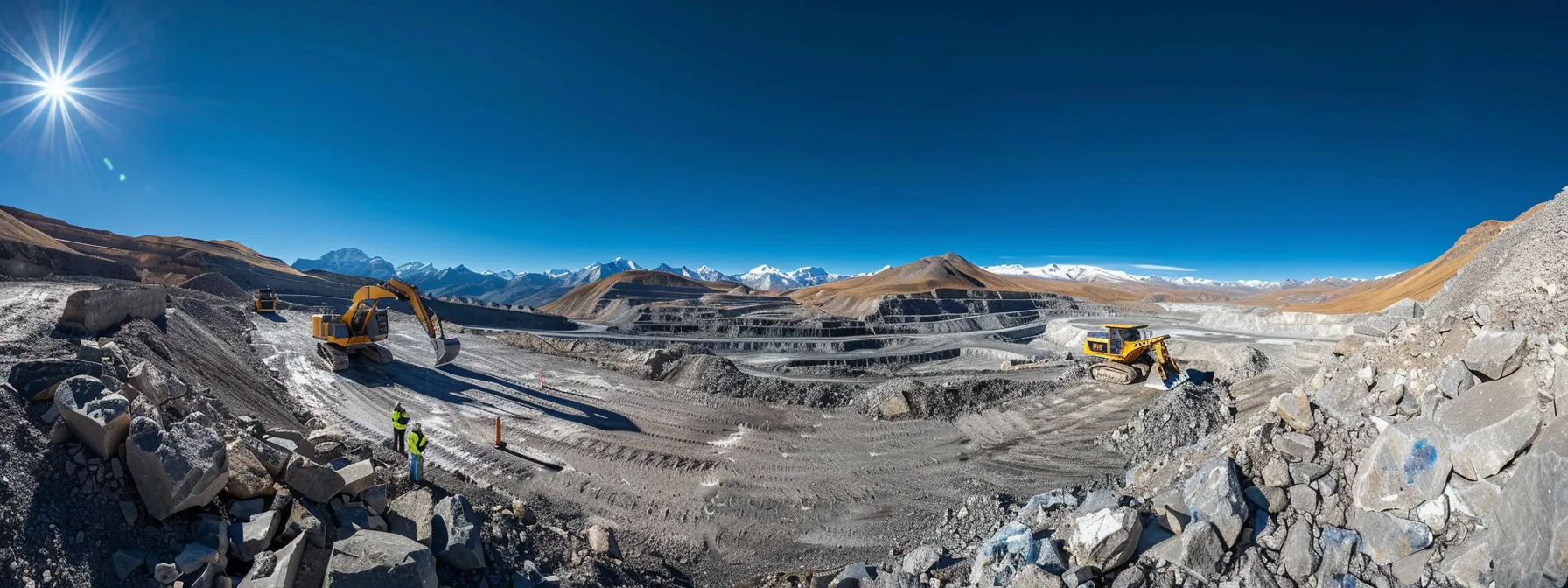In an industry where a single regulatory misstep can imperil your investments, understanding the legal landscape is as crucial as locating a rich resource vein. In this article, you’ll grasp the skeletal framework of regulations guiding mining and oil sectors, learn the ins and outs of obtaining essential licenses and permits, and discover how to safeguard your assets with robust contracts. You’ll also find strategies to navigate environmental laws and manage potential risks. For investors engaged in Bilateral Investment, this knowledge isn’t just information; it’s an asset that protects your investment byte by byte. Whether you’re a seasoned investor or considering your first venture into these rich industries, the insights you’ll gain here have the power to transform challenges into opportunities.
Essential Insights for Investors
- Deep legal knowledge is vital to manage risk in mining and oil investments
- Due diligence and environmental compliance are crucial for long-term investment stability
- Clear dispute resolution clauses in contracts protect investments against legal uncertainties
- Monitoring changes in international trade and environmental laws helps maintain investment value
- Seeking expert legal counsel is essential for navigating the complex regulatory landscape
Key Takeaways For Your Bilateral Investments

When diving into the mining and oil sectors, your asset management strategy has to be ironclad. You must balance your portfolio carefully in your bilateral investments, recognizing the unique opportunities and risks commodities pose, particularly against inflation.
Understanding the legal implications of debt in these industries is paramount. You’re likely to encounter a range of financing structures, and knowing how they align with your investment goals will be crucial to safeguarding your interests.
Monitoring the market’s flux is vital, as the commodity prices directly impact the profitability of your bilateral investments. Continuous assessment allows for timely adjustments to your portfolio, helping to mitigate potential losses.
Last but certainly not least is the power of due diligence. Before committing to any investment, ensure the legal groundwork is thoroughly vetted to prevent any surprises that could jeopardize your assets.
Understand Regulatory Frameworks for Mining and Oil Bilateral Investments

As you delve into mining and oil investments, understanding the regulatory environment is indispensable. You’ll need to analyze both national and local laws that shape resource investments, identify the regulatory agencies that oversee these sectors, and comply with international standards and conventions. This knowledge is pivotal to managing risk effectively, optimizing trade deals, and ensuring your foreign direct investment adheres to the letter of the law. Ensuring legal compliance not only protects your investments but could also offer strategic advantages in the fossil fuel market.
Analyze National and Local Laws Affecting Resource Investments
Entering the mining and oil markets requires a thorough analysis of national laws, which vary extensively by country and even region within countries. For example, within the European Union, regulations crafted by the European Commission may dictate policies that impact your ability to invest and the scope of your operations. You need to understand how treaties and national policy affect your investments, as local laws may impose additional stipulations that could influence operational costs and compliance requirements.
Furthermore, it’s not uncommon for disputes to arise that involve international tribunals, particularly regarding investments in foreign territories which involve a bilateral investment issue. Understanding the legal precedents set by such tribunals can provide invaluable insights into how to structure your investments and mitigate risks. Anticipating possible scenarios where the European Commission or a relevant policy-making body intervenes allows you to prepare a legal strategy in advance:
Identify Key Regulatory Agencies Governing the Sector For Your Bilateral Investments
In your foray into the mining and oil industries, you’re bound to encounter a number of influential regulatory bodies. Noteworthy among these is the arbitral tribunal, a key player in the resolution of disputes that may arise from international agreements. When you enter into contracts guarded by provisions from the United Nations Commission on International Trade Law (UNCITRAL) or under a bilateral investment treaty, an arbitral tribunal may be the authority that decides on matters of arbitration, should disputes occur.
It’s also essential for you to be aware of specific governmental agencies dedicated to the oversight of fossil fuel endeavors. These agencies are not merely regulatory watchdogs; they provide guidelines and enforce compliance, ensuring that your investment aligns with both national and international standards. Getting accustomed to the expectations and legal frameworks of these agencies allows for a smoother investment process and can guide you in structuring agreements to preemptively address potential legal challenges.
Comply With International Standards and Conventions
Staying in compliance with international standards is a foundational part of your due diligence as an investor in natural resources. The Energy Charter Treaty, for instance, offers a multilateral framework that could affect your operations in the energy sector. When you adhere to such international investment agreements, you protect your interests and ensure stable, long-term relations in the volatile markets of mining and oil.
Moreover, should disputes arise from your investments, the International Centre for Settlement of Investment Disputes (ICSID) provides a mechanism for international arbitration that is recognized globally. Aligning your investment strategy with the provisions of the ICSID and other relevant bodies helps to circumvent potentially costly and prolonged disputes, allowing you to focus on the profitability and sustainability of your endeavors in the mining and oil industries.
Secure Licenses and Permits Required for Resource Extraction

Navigating the intricacies of securing the needed licenses for exploration and the correct permits for operational activities is key to a robust investment in the mining and oil sectors. You’ll learn to determine necessary licenses, follow procedures for obtaining permits, and avoid common licensing pitfalls. Comprehending the finer details of agreements such as the North American Free Trade Agreement can inform your diversification strategy and ensure compliance within trade frameworks. With a clear focus, your path to compliant resource extraction will be streamlined and strategically sound.
Determine Necessary Licenses for Exploration Activities
Embarking on exploration in the mining and oil industries, you must secure the proper licenses to conduct your activities legally. Understanding the requirements set by the United Nations Conference on Trade and Development (UNCTAD) is key in navigating the complexities of international agreements and securing the licenses necessary for exploration. By doing so, you’ll minimize the risk of legal disputes and ensure that the price of entry into these markets reflects due compliance with global standards.
Moreover, as an investor operating under the terms of specific free trade agreements, such as those structured by the OECD, it’s essential to align your licensing strategy with the outlined provisions. This alignment helps not only in avoiding potential dispute resolution procedures but also in protecting your investments from unpredictable shifts in policy and market price fluctuations. By clearly understanding and adhering to these agreements, you’ll establish a foundation for successful, compliant resource exploration within the mining and oil sectors.
Follow Procedures to Obtain Operational Permits
For your ventures in the energy sector to flourish, securing operational permits is non-negotiable. The process can be intricate, spanning multiple levels of bureaucratic approval, and may hinge on specifics outlined in transatlantic trade and investment partnerships. Ensuring you adhere to the correct procedures can shield you from the complications of legal action from a court and protect the integrity of your fuel investments.
To navigate this regulatory landscape effectively, you need to know each step and fulfill all requirements: from initial application to securing environmental assessments and community agreements. The stages to be navigated include:
- Submitting comprehensive documentation in alignment with legal standards and trade agreements.
- Undergoing rigorous regulatory checks by appropriate energy authorities.
- Acquiring approval from local and international entities, considering the plural jurisdictions involved.
By meticulously following these steps, you position yourself to commence operations legally, reinforcing your investment’s legal foundation within the volatile spheres of mining and oil.
Avoid Common Licensing Pitfalls Investors Face
As a corporate investor in mining and oil, one must evade the common pitfall of underestimating the importance of bit rate analysis in licensing. This technical aspect, crucial to the infrastructure development of your projects, can lead to delays or increased costs if overlooked. Adhering strictly to bit rate specifications ensures compliance with regulations and smoothens the transition from exploration to extraction phases in asset classes.
You should also be cautious not to treat licenses and permits as mere formalities. The entanglement of legal requirements across different jurisdictions means that missteps in obtaining permits can incur significant risks for your corporation. A meticulous approach to licensing, one that involves understanding and respecting the interconnectedness of local and international laws governing extraction, is imperative for safeguarding your bilateral investments in mining and oil sectors.
Navigate Environmental Compliance in Mining and Oil Sectors

In investing within the mining and oil sectors, your company must prioritise environmental stewardship to meet the standards of both developed countries and international trade agreements. Navigating this crucial aspect involves conducting thorough Environmental Impact Assessments, implementing sustainable practices, and consistently monitoring and reporting environmental performance. Addressing these areas not only aligns with regulations from the United Nations and other bodies but also reinforces your commitment to responsible investment. As you progress, you’ll gain a clearer understanding of how proper environmental compliance can be both a legal obligation and a strategic advantage.
Conduct Environmental Impact Assessments Properly
Conducting Environmental Impact Assessments (EIAs) effectively is a critical step as you, an investor in the mining and oil sectors, move forward with your projects. It’s a process that not only helps prevent potential environmental damages and associated costs but also serves as a form of insurance against future legal challenges. Your adherence to EIA procedures showcases a commitment to sustainability, potentially protecting the stock of your company from the volatility associated with non-compliance.
Thorough EIAs enable you to understand and mitigate the environmental implications of your bilateral investments. Tailoring these assessments to the specific ecology of the extraction site minimizes risk and ensures that any tax credits for environmental stewardship are rightfully earned. The following steps guide you through the EIA process:
- Identify all potential environmental impacts linked to your project activities.
- Evaluate the significance of these impacts and develop mitigation strategies.
- Prepare a detailed EIA report to submit for regulatory approval, adhering to industry standards.
Conducting EIAs properly, then, is not just about legal compliance—it’s about making strategic decisions that enhance the long-term viability and ethical standing of your bilateral investment.
Implement Sustainable Practices to Meet Regulations
As you venture into the oil and mining sectors, embracing the energy transition is essential. Adopting sustainable practices not only secures your compliance with environmental regulations but strengthens the rights and well-being of communities affected by resource extraction. Your vigilance in sustainability safeguarding ensures the legality of your operations and positions you as a responsible player during this pivotal shift.
It’s imperative that you, regardless of nationality, uphold rigorous environmental standards that underpin your bilateral investment’s longevity and reputation. Integrating cutting-edge technologies and methodologies geared towards minimizing ecological impact goes beyond regulatory conformity—it cultivates trust and solidifies your company’s role in the sustainable future of energy. This proactive stance is not just good practice; it’s a strategic imperative for longevity in the global market.
Monitor Environmental Performance and Report Compliance
Monitoring environmental performance in the competitive sectors of mining and oil is a critical task for your investments, particularly when operating under international agreements like the Comprehensive Economic and Trade Agreement (CETA) between Canada and the European Union. Accurate collection and analysis of data on environmental impact is essential in demonstrating compliance with regulations, and informs your shift towards renewable energy sources when practicable, resonating with the global move towards a more sustainable energy future.
In the Netherlands, as in Canada, stringent environmental standards are in place to ensure corporate accountability and the protection of natural resources. Your diligent reporting of environmental performance not only satisfies the legal requirements but also reflects a commitment to transparency and sustainable development. This approach is crucial to maintaining the integrity of your investments and complying with both national and international trade frameworks:
- Establish a system for regular data collection on environmental metrics.
- Engage in continual analysis to detect areas requiring improvement.
- Prepare comprehensive reports addressing compliance with environmental standards.
Protect Investments With Solid Contracts and Agreements

To secure your rate of return in the volatile mining and oil markets, careful drafting of joint venture and partnership agreements is critical. You need to negotiate terms that protect your cash investments, ensuring market liquidity and upholding the rule of law. Familiarize yourself with dispute resolution mechanisms within these contracts to maintain sustainability and mitigate risks. In the following sections, you’ll uncover guidelines for drafting impactful agreements, negotiating with foresight, and understanding the intricacies of contractual dispute resolutions.
Draft Effective Joint Venture and Partnership Agreements
To fortify your investments in the mining and oil sectors, crafting joint venture and partnership agreements with precision is key. Whether your capital is tied up in a mutual fund or private equity, ensure these agreements clearly define equity terms, revenue splits, and mechanisms for resolving disputes. This vigilant drafting ensures that your interests are safeguarded, especially in markets with complex regulatory environments like China.
Your strategy must navigate the intricate demands of cross-border investments, where well-structured agreements are as necessary as the capital you deploy. Take the time to understand and articulate the rights and expectations of all parties involved, considering the various legal systems at play. This level of diligence maintains the balance of power within the partnership and prevents disputes that can erode trust and diminish returns on your investment:
Negotiate Terms That Safeguard Investor Interests
When negotiating terms within the mining and oil sectors, it’s imperative to consider diverse forms of asset protection, including those not typically associated with your industry. For instance, much like in real estate, where tangible evidence is critical, ensure contracts for metal extraction include terms for physical verification. This mitigates risk, much like a computer backup provides a hedge against data loss, offering you concrete proof of assets and operations, thus safeguarding your investment.
Your contract should function as a safeguard that anticipates scenarios impacting your investments. It’s crucial to include clauses that account for volatile commodity prices and potential regulatory changes. By stipulating these conditions, you create a resilient agreement that adapts to fluctuations, protecting your capital in a manner akin to hedging strategies used in financial markets:
- Include clear terms for price adjustment to account for market volatility.
- Ensure clauses are in place to address regulatory changes that might affect operations.
- Determine dispute resolution mechanisms that offer a fair and expedient path to conflict resolution.
Understand Dispute Resolution Mechanisms in Contracts
Understanding the dispute resolution mechanisms in contracts for mining and oil investments is essential, especially considering the substantial capital at stake. Dispute resolution clauses must be tailored specifically, taking into account the number of parties and jurisdictions involved. As an investor, familiarize yourself with arbitration procedures that could save you from lengthy and costly lawsuits, while ensuring expedited and binding resolutions compliant with property laws across countries, including the United Kingdom.
Moreover, your contracts should reflect a firm grasp of the environmental responsibilities involved in resource extraction, including stipulations for greenhouse gas emissions compliance. This not only serves to avert potential legal confrontations but also showcases your commitment to sustainable practices. Should disputes arise related to environmental obligations, equipping your agreements with robust resolution frameworks becomes imperative:
- Ensure inclusion of clauses that define measurable standards for greenhouse gas emissions to preempt any misunderstanding.
- Include provisions for independent verification to resolve disputes concerning property or environmental impacts.
Manage Risks With Legal Strategies for Investors For Your Bilateral Investments

As you explore Multilateral or Bilateral investments opportunities within the mining and oil sectors, it’s crucial for you to mitigate political and legal risks that invariably accompany foreign investments. Your involvement with commodities like natural gas and the implications of climate change demand meticulous due diligence prior to asset acquisitions. Additionally, in the fluid world of cryptocurrencies and evolving international investment agreements, securing comprehensive insurance coverage for operational liabilities is non-negligible. Each of these steps is fundamental in building a resilient investment strategy that can adapt to market shifts.
Mitigate Political and Legal Risks in Foreign or Bilateral Investments
To diminish political and legal risks in your foreign investments within the mining and oil sectors, it’s imperative to align with international regulatory bodies like the World Trade Organization. This alignment serves as a safeguard against the unpredictable nature of geopolitical shifts, ensuring that your financial interests are upheld under globally recognized trade norms. Nurturing relationships with host nations, such as Germany, known for its stable investment climate, can further reduce exposure to volatility, solidifying confidence in your finance strategy.
In the context of foreign direct investments, it’s crucial that you understand the character of each market’s regulatory environment. By closely monitoring legal systems in countries where your assets are located, you can anticipate and react to changes in legislation that could affect your bottom line. Implementing a robust legal framework that factors in the specific political landscape can protect your investments from the unforgiving volatility of resource-rich regions, providing a stronger footing for venture resilience and finance optimization.
Perform Due Diligence Before Asset Acquisitions
Before you commit capital to the mining and oil sectors, thorough due diligence is your critical line of defense. Focused research into company records, compliance with the World Bank Group guidelines, and climate impact assessments can alert you to potential risks. This step speaks your language of caution, as it sifts through the complexities of potential investments in regions like Colombia, ensuring you’re informed about environmental, social, and governance (ESG) standards before proceeding.
Diligent analysis reveals insights that are vital to making informed decisions: understanding the local legal framework, scrutinizing contractual language for clarity and fairness, and examining the geopolitical climate that could affect your assets’ future. Protecting your investments requires navigating these multitude layers with expertise, evaluating every facet to mitigate legal and financial surprises. Consider this checklist when performing due diligence:
- Verify compliance with environmental regulations and World Bank Group standards.
- Analyze the potential impacts of climate change on operations.
- Conduct in-depth research on the political and legal stability of Colombia.
- Ensure clear and precise language in contracts to prevent misunderstandings.
Secure Insurance Coverage for Operational Liabilities
As you navigate the complexities of investments in the mining and oil sectors, it’s imperative to secure comprehensive insurance coverage for operational liabilities. This essential safeguard functions as a strategic tool, mitigating risk exposure for your assets against unforeseen incidents, including those related to forest conservation and environmental mishaps. Engage with a lawyer skilled in negotiation to ensure that your policy is robust, addressing your unique operational needs and providing peace of mind as you advance your portfolio.
Consider insurance coverage as a critical component of your risk management strategy, akin to how cloud computing offers secure data backup and recovery in the tech sphere. By aligning with a legal advisor to tailor insurance solutions, you’ll protect your investments from the volatility inherent in the resource extraction industries. Your lawyer’s expertise will be indispensable in deciphering complex insurance clauses, turning this nuanced defensive mechanism into a potent ally for securing the longevity and profitability of your endeavors.
Stay Informed on Global Legal Developments Impacting Bilateral Investments

As an investor in mining and oil sectors, you must stay agile in the face of legal changes that can directly impact your holdings. Vigilant tracking of alterations in international trade policies, adapting to evolving environmental and taxation laws, and seeking ongoing compliance advice from legal experts are key to managing your investments. These measures are essential for responding effectively to global shifts, whether it’s monitoring natural resources legislation, understanding France’s latest tax reforms, or staying abreast of Permanent Court of Arbitration rulings—each having the potential to affect the value of your GUNR stock and the return on software investments.
Monitor Changes in International Trade Policies
In your investment journey within the mining and oil sectors, be alert to the live pulse of international trade policies which are pivotal in shaping the climate of regulation and supply and demand. Notably, directives from the International Chamber of Commerce can influence your drilling agreements and operational conditions, making it essential to stay abreast of their resolutions and guidelines.
Additionally, keep a close watch on the Paris Agreement, whose environmental benchmarks are increasingly reflecting in regulations affecting the energy industry. Your adherence to these evolving standards safeguards your investment against regulatory risk and ensures continued access to global markets, ultimately impacting your project’s bottom line.
Adapt to New Environmental and Taxation Laws
Adapting to new environmental laws is critical for your investments in the mining and oil sectors, particularly with the increasing focus on carbon emissions. In countries across Africa, governments are introducing stringent carbon policies that can affect your contracts and operational efficiency. The rapid evolution in environmental standards demands swift adaptation, ensuring your business practices in the mining and agriculture areas align with emerging regulations to avoid penalties and secure a competitive edge.
New taxation laws can have a profound impact on the profitability of your mining and oil investments. It’s essential to navigate these changes proactively, understanding how shifts in tax codes could alter the financial landscape of your business. Whether it’s kilobit-level adjustments or large-scale reforms, stay vigilant on how taxation can influence your operations and employ strategies to minimize liability while maintaining compliance:
- Regularly consult with legal experts on changes in environmental and taxation laws.
- Update your contracts to reflect the latest legal requirements related to carbon emissions.
- Review the financial impact of taxation changes on your mining and oil operations, particularly in African and agricultural contexts.
Consult Legal Experts for Ongoing Compliance Advice In Your Bilateral Investments
In an industry as complex as mining and oil, staying compliant with evolving legal standards is de facto for preserving your investments. It’s pragmatic to consult legal experts proficient in international trade law and knowledgeable in sector-specific legislations to guide you. They can decipher intricate policies and regulatory changes akin to Claude Shannon’s interpretation of binary code into ASCII, transforming legal complexities into actionable strategies for your investment security and growth.
Legal advisors act as a critical storage of knowledge and foresight, aiding you to navigate the intricate legal terrain that could impact your investments. By engaging with experts who track global legal developments, you safeguard your investments like data is protected by robust encryption. They will not only offer you up-to-date compliance advice but will also preemptively highlight potential areas of concern, thus enabling you to manage risks more effectively.
Conclusion

As you seek to link your aspirations for wealth with tangible assets, the legal essentials outlined here are pivotal to success in the mining and oil sectors. Whether your investments reach across the United States or span the globe, grounding them in sound legal principles is non-negotiable.
Remember, it’s not just about owning a slice of the bit gold pie—it’s about safeguarding that stake with clarity and foresight. Legal diligence is your guardrail along the path to asset security and enduring prosperity.
Your journey through these sectors requires a strategic approach where every legal detail and adjective describing your assets matters. Ensuring your steps align with the evolving legal standards epitomizes the blend of vigilance and wisdom necessary to thrive.
In an industry where each link in the chain counts, treat these legal essentials as the bedrock of your investment strategy, fostering stable growth for your wealth in the United States and beyond. With this foundation, you solidify your standing as a discerning, legally savvy investor.
Frequently Asked Questions
What are the basic regulatory frameworks affecting bilateral investments in mining and oil?
Mining and oil investments predominantly fall under environmental regulations, mineral ownership laws, tax policies, and investment agreements, which vary by country and region, affecting operational compliance and profitability.
Which licenses and permits are essential for resource extraction operations?
For resource extraction, securing a mining or drilling permit, environmental licenses, and land use approvals is critical to operate legally and responsibly.
How do companies comply with environmental regulations in the mining and oil sectors?
To comply with environmental regulations, mining and oil companies implement rigorous sustainability programs, conduct regular impact assessments, and employ state-of-the-art mitigation technologies.
What contract provisions should investors include to protect their mining and oil ventures?
Investors should ensure contracts for mining and oil ventures include clear dispute resolution clauses, environmental safeguards, and stipulations for political risk insurance to protect their investments.
How can investors stay updated on legal changes in the global mining and oil markets?
Investors should align with knowledgeable legal teams and subscribe to industry updates for the latest in mining and oil market regulations.
Conclusion
To navigate the complex landscape of the mining and oil sectors successfully, investors must prioritize legal diligence, ensuring compliance with international regulations and securing robust risk management through well-crafted contracts for their Bilateral Investments. Staying informed and adapting to global legal developments, especially in trade policies and environmental standards, is crucial for maintaining investment viability. Legal expertise becomes a cornerstone of strategy, transforming potential risks into managed assets and providing a competitive edge. Ultimately, reinforcing legal foundations fortifies investments against market volatilities, establishing a bedrock for sustained growth and profitability in these dynamic industries.


